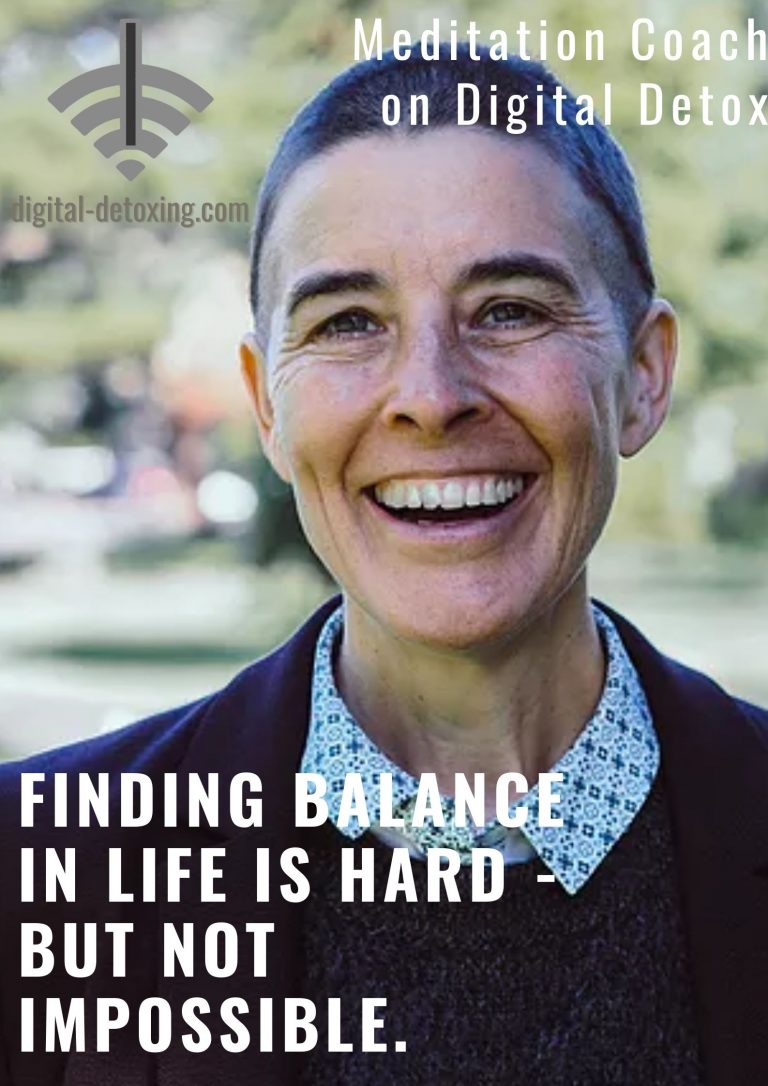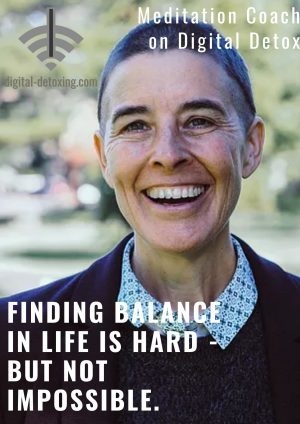Meditation
5 minutes to read
meditation
The idea was to get a better idea of meditation, work-life balance, and digital detox. I am pretty sure, that you are the perfect person to close this gap in our audience. Of course, we are going to link your webpage and include the photos on Pinterest, LinkedIn, and Instagram. Our goal is to spread the word as much as possible to create higher awareness.
How can meditation help to become less addicted to being online?
It’s a great question and a broad question so I’ll break it down into a few areas.
- Meditation is a form of mind training and allows us to form new habits. In practical terms, we learn
- to not react to every thought that arises
- how thoughts come and go and start to see options
- that the body reacts to sensations that last a few moments before disappearing
- This leads us to be more discerning about what and how we interact with all aspects of life, such as
- the devices themselves
- being selective with social media platforms
- whether it’s better to connect with real friends (online or IRL)
- how devices interrupt our social conversations
- the importance of switching off notifications
- best of all, we start to turn the devices off entirely!
- Meditation helps us become aware of the body’s sensations. When sitting, we might become aware of how
- a particular smell impacts our body
- an intense thought stiffens our back
- anger tightens the jaw
- hearing notifications startles us.
Why stress, burnout and a negative mindset is linked to our digital (daily) habits?
(a.) Stress and Burnout: being alerted all the time keep the cortisol activated, and cortisol production is highly correlated with the stress response.
(b.) Negative mindset: what I notice about emails and apps is that I react more quickly when I’m hopeful someone will like something I’ve done. This makes me feel more ‘popular’ (think of influencers). Then I check the app and it turns out to be an advertisement so I’m disappointed and felt unpopular.
(c.) Passive versus active scrolling: It’s important to understand how you’re interacting on social media. Passive and ‘doom’ scrolling are known to increase depressive feelings. However, active scrolling is a good way of engaging in life and beneficial if interacting with support groups.
What is the most useful tip for a better work-life balance, that you can advise?
a. Turn off all the notifications and put the phone on silent (not vibrate).
b. Remove as many apps as you can and use an app blocker (e.g. Opal)
c. If you spend money on food deliveries (e.g. Uber Eats, Deliveroo) or anything that sucks your time removes the apps.
d. Turn the phone off or put it out of sight when you’ve finished working. Place it in a drawer, leave it in the car overnight or hand it to your partner when you get home
e. Go to the App Store or Play Store and search ‘positive news’, ‘good news’ and read them as your news hit in the morning to start the day knowing it is good in the world.
What do you notice when people are exploring meditation for the first time?
- There’s lots of research about the benefits of meditation but not everyone experiences this at the beginning. People can enjoy it or dislike it. It may be calming but it may be unsettling because people become aware of the number and speed of thoughts. Many people meditate once and come back years later. It’s much easier to meditate in a group than on your own.
- People are usually oriented to either calming the mind (shamatha) or gaining insights (vipassana). Both are valuable. If you prefer shamatha, switch to vipassana and vice versa.
- The benefits are fairly quick but not always for slowing down the thoughts as slowing the thoughts or clearing the mind takes practice. When a person focuses on looking for positive experiences, they will find life slowly becomes more positive and people will respond more positively in stores and at work.
- Getting into the routine of a daily meditation practice takes a while. Go gently with yourself. Always do slightly less than what you’d like to do and build it gradually. I’ve met people who went too far too fast which led to psychological problems. Also, on occasion, old unresolved pain can surface. Always follow your gut instinct and if you need to see a counselor, do so. Meditation won’t cure all psychological problems.
- A couple of suggestions for beginners who want to meditate:
- At home: Turn the phone to airplane mode before bed, set a timer for 60 seconds and sit calmly. If it’s helpful, count breaths (count 1 at the end of each out-breath). Do this for a week. In week 2, set the timer for 2 minutes. Add a minute every week if you feel ready. 5 minutes is quite a lot if you’ve never meditated before. Don’t be in a hurry to get to 15 minutes.
- At a meditation centre: Have a look in your local community to see which centres offer meditation. Most are Buddhist but there are also Christian ones through community colleges. It’s very supportive to meditate with others and it’s much easier, too. You can ask questions to the instructor at the end. If the community doesn’t feel right, trust your gut and look for another place.
Last question, but one of the most important ones: Why are you doing, what you are doing?
I would like to see people doing well in their lives. Meditation and counseling have been pivotal for improving all aspects of the quality of my life mostly by learning how to be kind to myself. It’s a pity not to share this with others. Who doesn’t want to have a kinder society?
It’s for this reason I created a company to support entrepreneurs to manage the emotional roller-coaster of starting a business by learning loving-kindness meditation. If you think loving-kindness meditation is only for the soft and weak, bring to mind someone who gave you bad marks on your assignment and wish them kindness and care – it’s tough! If people would like further information about my services, please go to www.kindlycutthecrap.com.
meditation

